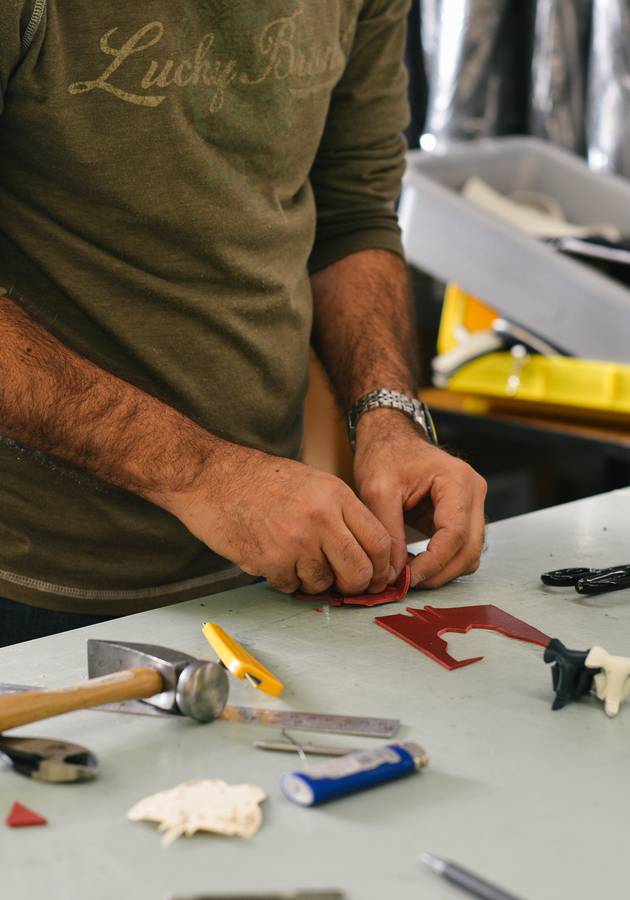How do you go about founding and leading a successful business? The key is not to emulate what large, established companies are doing, but instead to rethink the way in which we work.
Jason Fried and David Heinemeier Hansson, founders of 37signals, share their own experiences in “Rework.” They offer an alternative to traditional business knowledge with a fresh new look at the world of start-ups and entrepreneurship. So, get ready to rethink your business strategies and rework!
Don’t wait!
While we all have ideas, and will continue to have new ideas, inspiration has an expiration date. So, when you feel inspired, don’t wait to build your business - start immediately.
You might be thinking that you don’t have enough time to start a business, but there is always enough time in your day. You don’t have to quit your day job to start creating your own business (and in fact, you shouldn’t!), but you could work on your project instead of watching TV, or go to bed one hour later than you usually would.
Keeping your day job means you are not risking anything, and allows you to “test” your idea to see if it could be a viable business. If you are struggling to find an idea, you should always aim to create a product or service that will solve a problem. This will allow you to find a way to the solution.
Truly believe in your product. There should be a sense of urgency about it, and a desire to create something valuable. The authors say, “What you do is your legacy.” This will help you to stay on track with why you are doing what you are doing. Believe in what you are doing and take a strong stand on it.
You do not need vast amounts of money to start a business. All you really need is yourself and a laptop, and whatever resources you have available. Getting investors or getting outside money will mean giving up control, and might result in your product ceasing to be what you truly believe it is. Also, do not start your business with an exit strategy in mind! That is like starting a relationship with a plan to break up.
How to start
Hansson says you should not be afraid to stay small. Less isn’t necessarily a bad thing - it means less bureaucracy and lets you adapt more quickly. Your decision making is intuitive and timely, since the distance to your customers is not wide. Being a bit obscure also means you can try out new things. Once you grow, you lose a lot of your flexibility.
See your constraints as a positive thing: they mean you have to find creative solutions, since you need to make it with whatever you’ve got. The greatest writers of all times, such as Shakespeare or Hemingway, even actively used restraints to improve their writing.
So, how do you go about creating the perfect product? Keep in mind that less is more. Cut your ambition in half and only keep the essentials of your ideas. Otherwise, they can easily turn into sub-par products, because you are trying to focus on too many things at once.
Start at the epicenter. What do you have to do?To find your epicenter, ask yourself, “If I took this away, would what I'm selling still exist?” For a hot dog cart, for example, you shouldn’t start by worrying about the cart or the decorations, but about the hot dog itself.
A good core business focuses on things that don’t change - things that people will still want a decade from now. Don’t chase fashions, but instead focus on something long-lasting. For example, Amazon focuses on “fast (or free) shipping, great selection, friendly return policies, and affordable prices.” Their products change, but the core ideology stays the same.
Don’t put off making decisions. Waiting to make decisions will mean they pile up. Instead, adopt a “good enough” approach – you don’t have to be perfect, but you need to get things done to keep your business moving forward. That way you are keeping motivation and morale high as well. Once your product does what it needs to do, launch it! Otherwise you will lose momentum.
Being productive
To be productive, you need to keep things real. Remove layers of abstraction when you are trying to explain something. For example, instead of using convoluted sentences, simply draw what you mean. Using abstract terms will give an illusion of agreement, since it is not clear what everyone is “agreeing” on.
Interruptions are the enemy of productivity. To get the most out of the time while you are working, try introducing some alone time. These should be designated times when nothing and no one is allowed to interrupt you – you will be surprised how much work you are suddenly getting done!
The worst kind of interruptions are, of course, meetings. In the worst case, these can cost you 10 to 15 hours per week of productive work time! So, avoid having meetings as much as possible. If it is absolutely necessary to have one, then make it as productive as you can by following these simple steps:
- Set a timer to end the meeting.
- Only invite a select few.
- Have a clear agenda and discuss a specific problem.
- Don’t meet in a conference room, but rather at the site of the problem.
- Appoint someone at the end who is responsible for implementing the solution.
While uninterrupted work time is good, working overtime is bad. All-nighters are more harmful than beneficial to your company. Even though workaholics might spend more time at work, they are often not getting more done. Not to mention, a lack of sleep can result in stubborn, uncreative, and irritable employees.
Finally, to be most productive, avoid business plans! A business plan is nothing but guesswork. You don’t know what is going to happen in the far future! Instead, go small. Only plan a few weeks ahead to remain flexible. This will also keep motivation and drive alive since you have “quick wins.”
Similarly, instead of making long to-do lists, split these into smaller ones. Instead of making big decisions, make tiny ones to avoid big mistakes. Tiny decisions are, by default, only temporary and will allow you to grow with the market.
Growing your product
Whatever your business may be, you will probably have to deal with competition. And if you produce a great product, there will certainly be someone who will try to copy it. So, to protect yourself from copycats, de-commoditize your product – make yourself part of it.
There are things that are so uniquely you, that it will be impossible for anyone else to copy them. In fact, you might as well take people behind the scenes to make your product stand out from the competition. You can even teach people about aspects of your product, such as Hoefler Type Foundry who offer online courses on type.
You can even use your competition to position your product – simply say you are anti-something. If you are a new independent coffee shop, for example, you can start your marketing campaign by saying that you are anti-Starbucks. This is one of the quickest and most effective ways to gain followers.
But, don’t be a follower yourself. It can be tempting to copy others or to outbid the competition through one-upping. But instead of always adding more features to your product to make it better than the competition’s, stick with what you are good at. This could mean ending up with a very basic product, but basic needs are constant - there will always be more customers for products that fulfill them.
In any case, don’t become obsessive about the competition. It will turn you from being visionary to reactionary. You want to be a leader, not a follower.
In the same way that you should not simply react to what your competitors are doing, nor should you react to everything your customers say. If you keep adding features that your existing customers request, you could end up with a product that doesn’t attract new customers.
Sure, if the same thing comes up over and over again, you should change it. If you are a chef and a lot of customers tell you the food is too salty, then you should probably act on that. But otherwise, practice saying, “no,” even to your own, brilliant, ideas – keep your eye on the prize!
Aim to build a product that is “at-home good” (rather than “in-store good”) – a product that people take home and are even more amazed with than expected. A product they learn to love so much that they will recommend it to their friends.
In general, be honest, open, and clear. Show who you really are, both to your customers and to your employees. Honesty wins trust. And people who trust you will buy from you. This also means owning up to any mistakes you may make.
Working with others
If you want to hire people, never hire them for a job you haven’t already done yourself. Always get the experience first, before getting someone else to do it for you. That way, you know what you are looking for when you eventually hire for the position.
Don’t hire simply because the person seems to be great. There are a lot of companies who hire new people whenever they hear about someone with great skills. They invent a job position, and hire them. But then, there is no actual work for them to do. Only hire someone when you really need new personnel. Don’t be scared of “missing out” – especially in today’s globally connected world, you can hire talent from anywhere on the globe when you need them.
Smaller, more intimate teams will also foster a more honest work culture. When someone comes up with a bad idea, you will know each other well enough to be critical when you need to be. This becomes infinitely more difficult when you keep adding new faces to the team.
When you need to hire, don’t fall into the same trap as others by simply using that person’s resume or years of experience as a hiring criterion. Instead, follow your gut and “take them for a test drive.” Give them a mini-project to complete, so that they can prove their skills. If you are choosing between two people, always hire the better writer no matter what the position is, since “clear writing is a sign of clear thinking.”
Give your employees freedom to think and work. You want what Hansson calls “Managers of One” working for you - people who, “come up with their own goals and execute them.” Don’t treat your employees like children. They will become less productive and show less initiative if they have to ask permission every time they want to do something.
Finally, you want people to work for you who have a life outside of the company. As much of a life as possible, in fact. People who have something to look forward to at home will get down to work more efficiently than those who do not.
Final Notes
To build a successful company, keep your focus on the essentials: only hire when necessary, keep your product basic and your team small. This allows you to allocate your time and resources to where they are actually needed.
“Rework” is engagingly written and has convinced economists - even though it is based on experience, rather than on academic research. Mark Cuban, owner of the Dallas Mavericks, is definitely a fan, saying, “If given a choice between investing in someone who has read Rework or has an MBA, I'm investing in Rework every time. This is a must read for every entrepreneur.”
12min Tip
Have a blog or a social media site that you update regularly – this allows you to build an audience for your product or services.





























